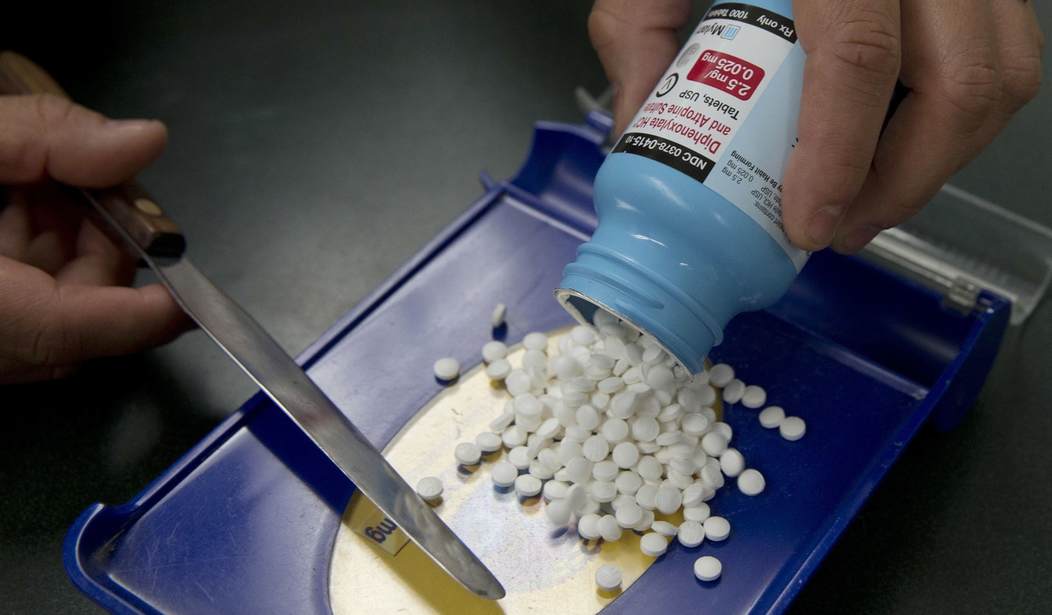How can you tell if competition is working in a given market? Generally speaking, prices go down while quality goes up. Productivity increases as more efficient methods are discovered. Shortages are rare to nonexistent. And, most important, consumers win.
Government intervention, monopolies, and other market distortions can disrupt the normal rules of supply and demand, fostering competition that's actually pernicious to consumers.
These distortions are now a major problem in healthcare.
With respect to medicines, the problem is that "everybody wins when list prices rise, except for the patient," as Health and Human Services Secretary Alex Azar told PBS earlier this month. Azar was describing the role of so-called Pharmacy Benefit Managers (PBMs), pharmaceutical drug middlemen with major market clout and who play a causal role driving up drug prices.
Indeed, there are plenty of red flags about PBMs role in the market. Instead of helping their tens of millions of customers, PBMs are exploiting loopholes in the system, to the detriment of patients, manufacturers, and small family-owned pharmacies.
Patients, as detailed in the PBS segment which featured Azar's remarks, are increasingly finding that their medicines cost less if they pay for them “out of pocket” rather than through their insurance plan, to which they pay hundreds or thousands of dollars a month. A pharmacist interviewed in the story provided a representative example of a cheap generic drug. It cost the store $1.61 to buy, and they normally sell it for $4 -- a profit of $2.39. But the PBM-negotiated copay is $10.84, of which the PBM keeps $8.91.
PBMs have become increasingly aggressive in securing so-called "gag orders" with suppliers, partner pharmacies, and other companies in business deals preventing these companies from informing customers, or the public, that they could buy the same drugs out of pocket for less than their copay. While PBMs are supposed to be using their clout to secure a better deal for their customers, instead they're using it to silence other companies from letting people know how badly they are getting ripped off.
Recommended
Worsening the problem, the PBM industry has undergone rapid consolidation, both horizontal and vertical. Three companies now manage plans for 180 million Americans. The result is significantly decreasing competition, rising anti-competitive practices, and skyrocketing PBM profits.
There are broader impacts on overall health care costs too. Some of the dramatic increases in drug prices that have drawn scrutiny in recent years, such as the 400% increase in the price of EpiPens, were later revealed to have been driven largely by market distortions introduced by PBMs. As Rep. Buddy Carter, the only pharmacist in Congress, wrote when he discovered in a hearing that EpiPens' manufacturer's revenues had actually decreased despite the price increase, "if the manufacturer that develops and markets a drug is not benefiting from the increased prices, where is the money going?"
Given its deep government involvement, the health care sector is notorious for turning the normal logic of market competition on its head, resulting in higher prices and decreased quality over time rather than the normal healthy benefits created in other sectors.
But even for healthcare, the behavior of PBMs in recent years is glaring. President Trump was right to call attention to their role in his speech on drug prices earlier this year, and his administration should continue looking at ways to ensure consumers aren't the victims of sophisticated, politically connected corporations.
A good start would simply be to increase transparency surrounding the deals struck by PBMs. Unlike most other parts of the healthcare sector, or any industry that receives hundreds of billions in taxpayer funds, there's almost zero public visibility into the actions of the PBMs. After all, there's a reason they were so interested in gag orders -- if everybody knew what they were doing, they'd be outraged.
Sally C. Pipes is president, CEO, and Thomas W. Smith Fellow in Health Care Policy at the Pacific Research Institute. Her latest book is “The False Promise of Single-Payer Health Care” (Encounter 2018).

























Join the conversation as a VIP Member